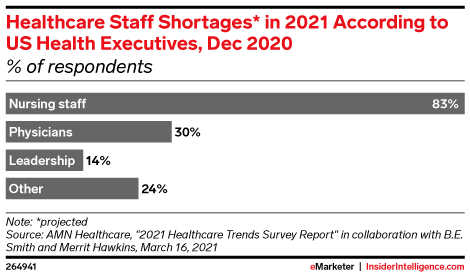The news: AI-powered healthcare startup Notable raised $100 million in Series B funding led by Airbnb and Zoom investor Iconiq Growth, boosting the company’s valuation to $600 million.
What it does: Notable’s tech continuously scans electronic health records (EHRs) to identify which workflows to automate, including patient intake, scheduling, co-pay collection, prior authorization, and claim denial management.
The opportunity: There’s a shortage of healthcare workers that’s only expected to get worse and tech like Notable’s can fill in gaps by automating human-powered tasks like patient intake.
- About 18% of healthcare workers have already quit their jobs since the onset of the pandemic, and another 12% have been laid off, per a September 2021 Morning Consult survey of 1,000 US employees.
- And the healthcare worker shortage will only worsen over the next year as burnt out workers jump ship: Among health care workers who have kept their jobs during the pandemic, 31% have considered leaving.
Notable’s tech can help hospitals’ front desk staff and medical assistants that are stretched thin:
- It boasts an 85% pre-visit intake completion rate, automatically uploading documents into the EHR and populating patient responses for providers prior to the visit.
What’s next? Tech like Notable’s will catch the attention of more health systems, namely by addressing cost-savings in two key areas:
1. Encouraging patients to pay their copays.
Patients’ unpaid medical bills are bad news for health systems, as they contribute to the overall cost of uncompensated care—which topped nearly $42 billion in 2019, according to the most recent American Hospital Association data.
- Most US consumers say they’re more likely to pay their medical bills if a hospital provides digital billing options, which tech companies like Cedar and Notable offer.
- For example, Notable allows patients to make payments on its mobile interface, which has reportedly led to a 300% increase in copay collection among its hospital clients.
2. Reducing costly cyberattacks.
Notable offers automation for a wide range of tasks, which means hospitals don’t have to tap different vendors (a major cyber security risk).
Consolidating vendors reduces the chance of a third-party platform weakening a hospitals’ security system.
- For example, in April 2021, cybercriminals broke into radiation therapy platform Elekta, affecting over 40 US health systems like Yale New Haven.
- One single AI vendor could go a long way to reducing hospitals’ financial burden: An average data breach costs healthcare organizations more than $7 million per incident, according to IBM.
Credit: Source link



